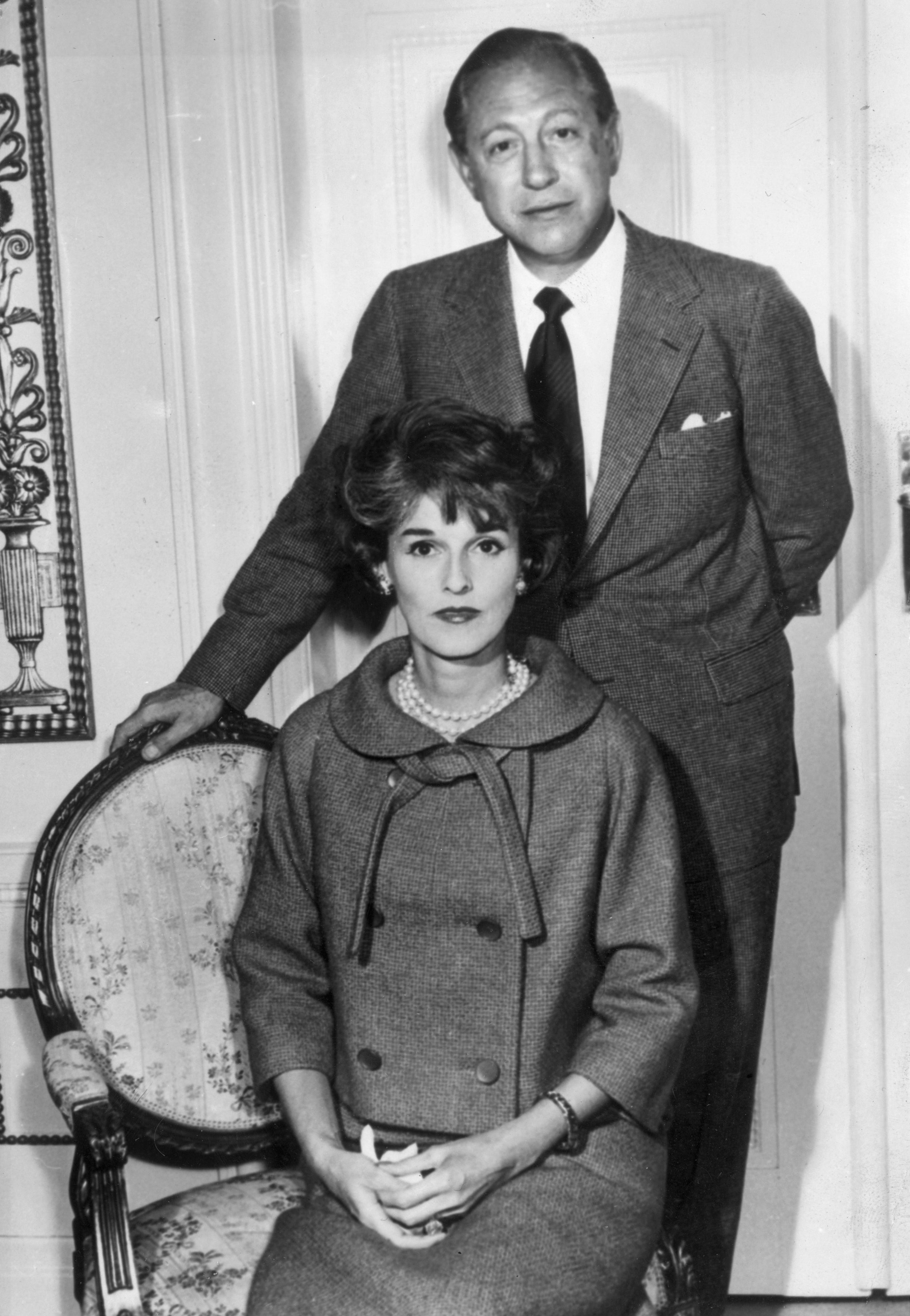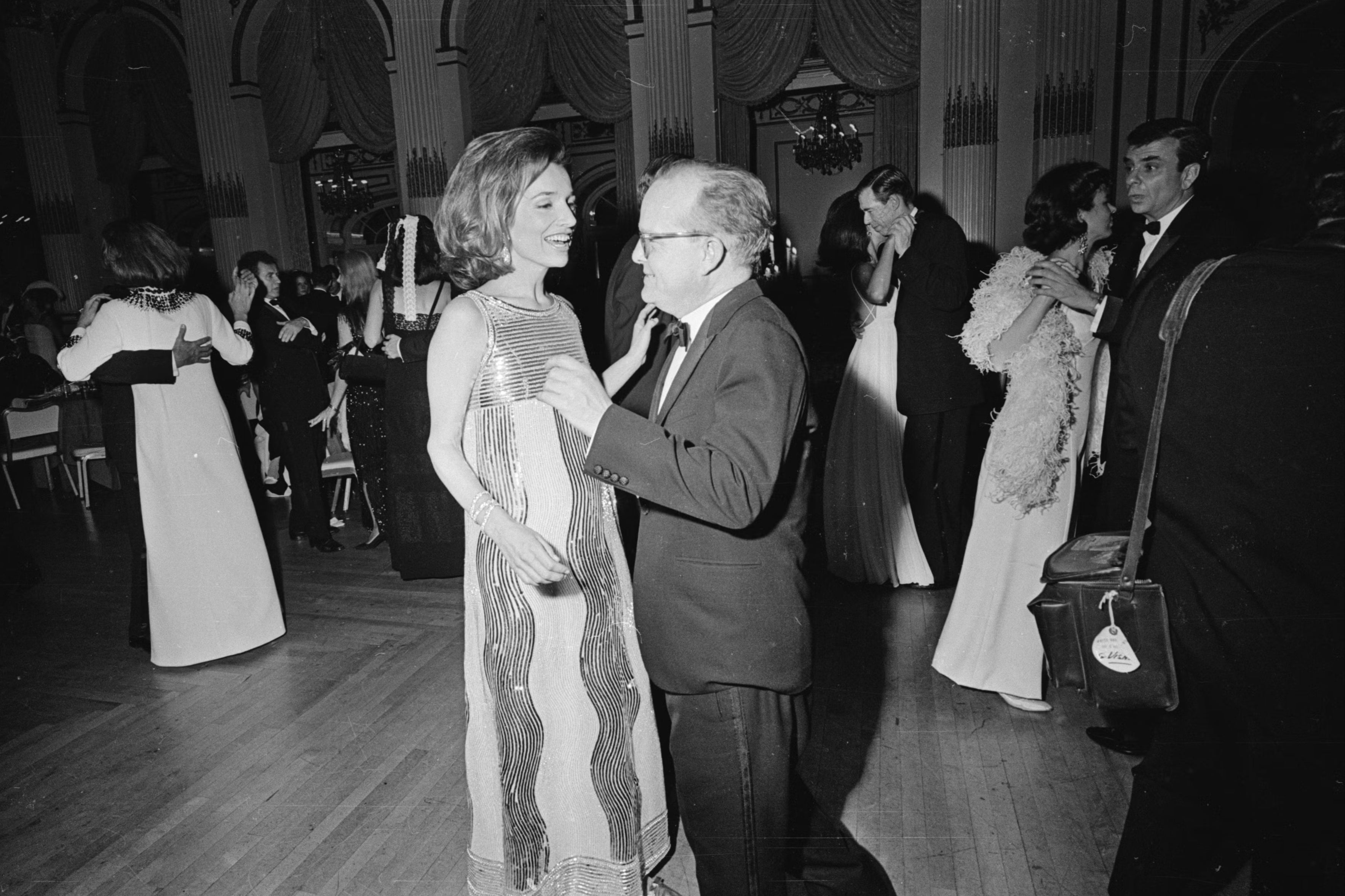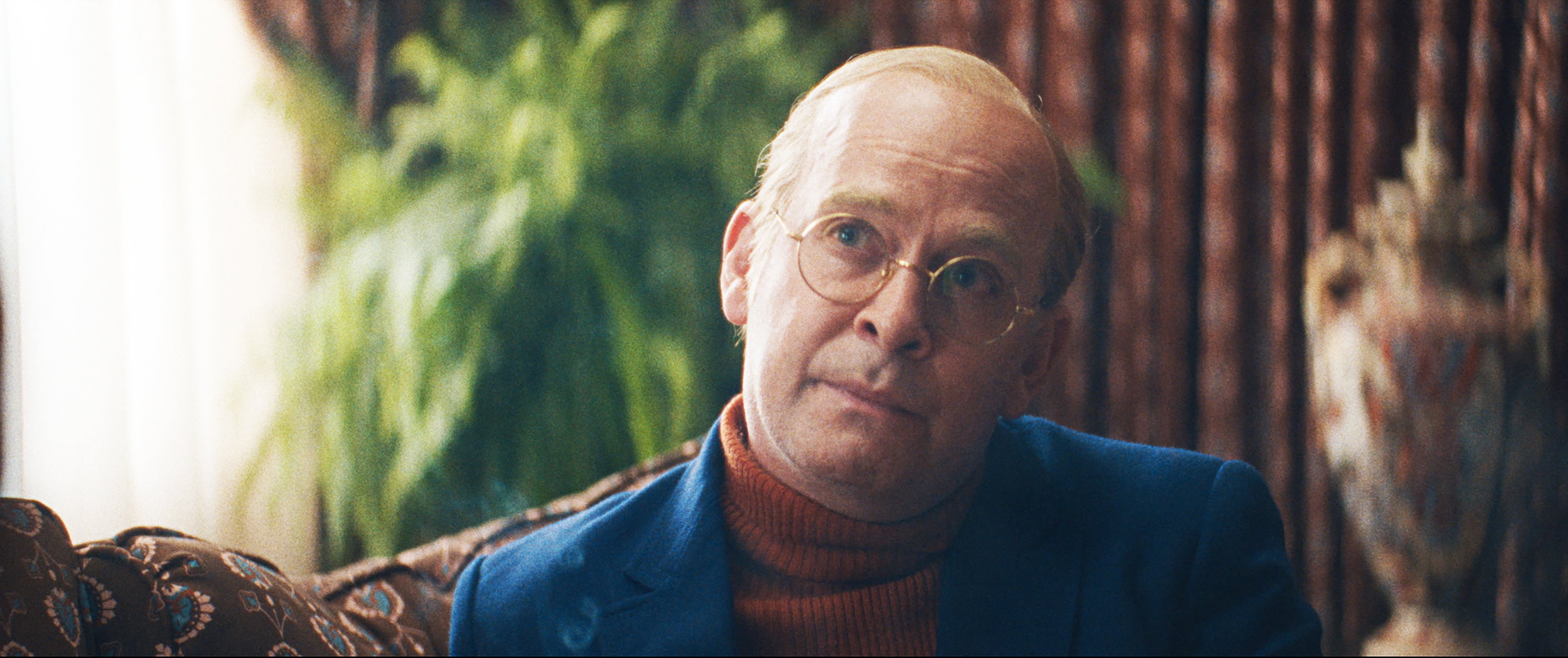Betrayal, the Black and White Ball and a mysterious ‘magnum opus’: The true story behind Capote vs The Swans
In 1976, Truman Capote published a short story in ‘Esquire’ that destroyed his friendships with New York’s elite and damaged his literary reputation. As a new TV series airs starring Tom Hollander as Capote, Katie Rosseinsky explores the scandal that became the author’s undoing


All literature is gossip,” Truman Capote once proclaimed. The author was certainly very good at both: by the mid-Seventies, he was not just lauded as the author of the groundbreaking In Cold Blood, but the proud possessor of one of the most star-studded contact books in New York. His wild anecdotes and deliciously bitchy quips, dished out in distinctively high-pitched Southern tones, made him a fixture on every guest list, the diminutive court jester of high society. But Answered Prayers, the novel he pictured as his answer to Proust’s A la recherche du temps perdu, would prove that literature and gossip could also be a truly toxic combination.
On an autumn morning in 1975, Babe Paley, the darling of New York high society and one of Capote’s best friends, picked up the phone and dialled the number for fellow socialite Nancy “Slim” Keith. “Have you seen Esquire?” she asked, imploring Keith to call back once she had read the November issue. Why was the usually cool, even imperious Paley so shaken? Because within the magazine’s pages was a chapter from Answered Prayers, and it was less a short story than the literary equivalent of a grenade.
In La Côte Basque, 1965, named after a New York restaurant where the wealthy went to see and be seen, Capote had revealed the secrets of his “swans”, a coterie of rich, beautiful New York women. He’d spent decades cultivating their friendship, only to parade their confessions for public consumption. Paley, who had considered Capote her closest confidante, was utterly humiliated: one of La Côte Basque’s gossipy anecdotes seemed to mock her husband Bill’s infidelity. It was a devastating act of betrayal – and for Capote, it was the beginning of the end. What made the famous writer stab his closest friends in the back? Almost half a century later, this literary scandal has been brought to life in Feud: Capote vs The Swans, a TV series from FX based on Laurence Leamer’s book Capote’s Women. Produced by Ryan Murphy and airing here on Disney+, it stars Tom Hollander as the writer and Naomi Watts as Paley.
Born in New Orleans in 1924, Capote became obsessed with wealth and beauty as a child: many of his biographers have traced this back to his fraught relationship with his social-climbing mother Lillie Mae, who sent him off to live with family in Alabama. At the age of 24, he published the semi-autobiographical Other Voices, Other Rooms, the story of a boy looking for the father who abandoned him. It ended up staying on the bestseller list for nine weeks, and he’d go on to work on screenplays and theatre scripts, building a network of glamorous pals as he went.
Capote released Breakfast at Tiffany’s in 1958, with the famous film adaptation starring Audrey Hepburn as Holly Golightly following three years later. But it was his 1965 work In Cold Blood that made him a bona fide celebrity. Hailed as a revolutionary piece of narrative non-fiction, it explored a notorious Kansas murder case, along with the subsequent investigation and trial. The author had spent years interviewing local residents and police; he’d also controversially ingratiated himself with the suspects. The end product was like nothing that had been published before, laying the groundwork for modern true crime. Everyone wanted a piece of the author: on TV and radio shows, in magazines and at fancy soirées. Capote cemented his place at the pinnacle of high society by throwing a lavish party of his own, christened the Black and White Ball, at the Plaza Hotel in 1966.

The guest list was a mix of cultural heavy-hitters and elegant socialites. In the latter category were the women Capote referred to as his “swans”, the group of dazzling, impeccably turned out (and staggeringly rich) women who were practically American aristocracy. His favourite was Babe Paley, a former Vogue fashion editor and best-dressed list mainstay who was married to Bill, the president of the broadcasting network CBS. Capote called her “the most beautiful woman of the 20th century” and said that she had only one flaw: “She was perfect. Other than that, she was perfect.”
Through her, he would meet Slim Keith, played by a poised Diane Lane in Capote vs The Swans; as a young model in Los Angeles, she mixed in starry circles, eventually marrying director Howard Hawks and launching Lauren Bacall’s career (Keith showed Hawks a copy of Harper’s Bazaar with a young Bacall on the cover, or so the story goes). She’d go on to marry hotshot producer Leland Hayward (who brought The Sound of Music and South Pacific to Broadway) and a British banker, Kenneth Keith, who also happened to be a baron. Other fixtures in Capote’s inner circle were Lee Radziwill (Calista Flockhart), the younger sister of Jackie Kennedy who was obsessed with getting out of the first lady’s shadow, and CZ Guest (Chloe Sevigny), a wealthy, Boston-born WASP. She’d lived a scandalous youth, appearing in the Ziegfeld Follies on Broadway and posing naked for the artist Diego Rivera, before settling down to marry a polo champion.

Capote had grand plans for his next fiction project, a novel he titled Answered Prayers. In a note sent to his publishers as early as 1958, he described it as “my magnum opus”; later, he boasted that it was “going to do to America what Proust did to France”. But after the in-depth, harrowing reporting process required for In Cold Blood, Capote was creatively spent – long boozy lunches and parties with the swans seemed more appealing than hours at the typewriter. He missed deadline after deadline, managed to negotiate bigger and bigger contracts with Random House despite this, and made correspondingly grandiose claims about the novel he believed would secure his status as an all-time great.
I’m a writer, and I use everything. Did all these people think I was there just to entertain them?
He had high society in his crosshairs: after spending years dredging old scandals from his diaries, Capote sold one chapter of Answered Prayers, “Mojave”, to Esquire. It was greeted with little fanfare. The next instalment, La Côte Basque, 1965, was crammed with blatantly obvious (and none too flattering) fictionalisations of his friends. Reading a draft shortly before its publication, Capote’s biographer Gerald Clarke warned the writer that the story was unlikely to go down well. “Nah, they’re too dumb, they won’t know who they are,” came his response. Capote had wildly underestimated his friends – La Côte Basque’s publication would prove utterly explosive.

Watch Apple TV+ free for 7 day
New subscribers only. £9.99/mo. after free trial. Plan auto-renews until cancelled.
ADVERTISEMENT. If you sign up to this service we will earn commission. This revenue helps to fund journalism across The Independent.

Watch Apple TV+ free for 7 day
New subscribers only. £9.99/mo. after free trial. Plan auto-renews until cancelled.
ADVERTISEMENT. If you sign up to this service we will earn commission. This revenue helps to fund journalism across The Independent.
The story dramatised a long lunch at the restaurant, with writer (and Capote surrogate) PB Jones trading gossip with Lady Ina Coolbirth, “a big breezy peppy broad” who was blatantly Slim Keith. One anecdote concerned the philandering Sidney Dillon and his affair with the dowdy wife of a New York governor; after sleeping together, Dillon realises her menstrual blood has left a stain “the size of Brazil” on the mattress, and frantically attempts to scrub the sheet (and even dry it in the oven) to prevent his house-proud wife Cleo from noticing. The Dillons, it was obvious to anyone familiar with New York’s upper social strata, were the Paleys: hence Babe’s panicked call to Slim on that autumn morning.

They weren’t the only ones skewered by Capote. Socialite Gloria Vanderbilt was painted as too stupid to recognise her ex-husband. “Lady Ina” mouthed off about a tedious dinner with Princess Margaret (“Her mother’s a darling, but the rest of that family!”). But it was Ann Woodward who was perhaps portrayed most cruelly. A former radio actress and chorus girl, she had married into a wealthy banking family, but the union was unhappy. In 1955, after attending a dinner party held in honour of Wallis Simpson, Ann shot and killed her husband William Woodward Jr.
There’d been rumours of a prowler lurking in their Long Island neighbourhood, and Ann said she’d mistaken William for an intruder. A grand jury concluded that the death was an accident, but rumours swirled, insinuating foul play. Capote approached her on a trip to St Moritz the following year, but she dismissed him with a homophobic slur. He had his revenge on “Mrs Bang Bang” by putting her in La Côte Basque – and claiming that her literary alter ego, the calculating “Ann Hopkins”, had “got away with cold-blooded murder”. Just a few days before Esquire was published, Woodward overdosed on sleeping pills. There were rumours that she’d seen an advance copy (although there was no hard evidence to back this up).
The fallout was seismic. Paley, horrified at seeing her private pain used as literary fodder, never spoke to Capote again; she was terminally ill with lung cancer at the time, and the author wasn’t invited to her 1978 funeral (an event she had planned meticulously, specifying food, wine and flowers). Keith reportedly considered suing her former friend for libel. But Capote remained bullish, at least in public. “What did they expect?” he said. “I’m a writer, and I use everything. Did all these people think I was there just to entertain them?” The only swan who didn’t ostracise him was Guest. “Of course he was going to use the material sooner or later,” she said. “[But] I never told Truman anything of importance.”

Cast out from the swans’ gilded world, Capote doubled down on drink and drugs, swapping posh lunches for debauchery at Studio 54 and Andy Warhol’s factory. None of this was conducive to finishing off the book he’d touted as a masterpiece in the making. Two further chapters of Answered Prayers, “Unspoiled Monsters” and “Kate McCloud” were published in Esquire, but after that? Nothing but a series of rumours and myths. Some of his remaining friends have claimed Capote would bring a finished manuscript to parties, regaling guests by reading aloud. “He had many, many pages of manuscript, and he started to read them,” Joanne Carson (played by Molly Ringwald in the TV show) would recall. “They were very, very good.”
There are many stories about what happened to Answered Prayers. Capote would claim that his lover John O’Shea had run off with one of the chapters (he tried to sue him, but eventually dropped the case). Some scholars believe he may have destroyed the manuscript in a drunken fit of pique – or that he never actually finished it in the first place. Carson, who was with Capote when he died in 1984, said that he had hidden it in a safety deposit box in a secret location: “The novel will be found when it wants to be found,” he told her, keen to foster a mystique even at the very end.
When his editor, lawyer and biographer searched Capote’s house shortly after his death, they found no trace of Answered Prayers (although in 2012, another chapter, titled “Yachts and Things”, was discovered in an archive at the New York Public Library). Perhaps it is lurking somewhere in the United States, waiting for someone to make the discovery of a lifetime. Or maybe Capote never got beyond writing that handful of chapters. Either way, the book – and the betrayal it necessitated – weighed heavily, even painfully, on Capote’s mind until his final moments. His last words, according to Carson’s account? “Beautiful Babe” and “Answered Prayers”.
Feud: Capote vs The Swans is on Disney+ from 17 April
Join our commenting forum
Join thought-provoking conversations, follow other Independent readers and see their replies
Comments
Bookmark popover
Removed from bookmarks